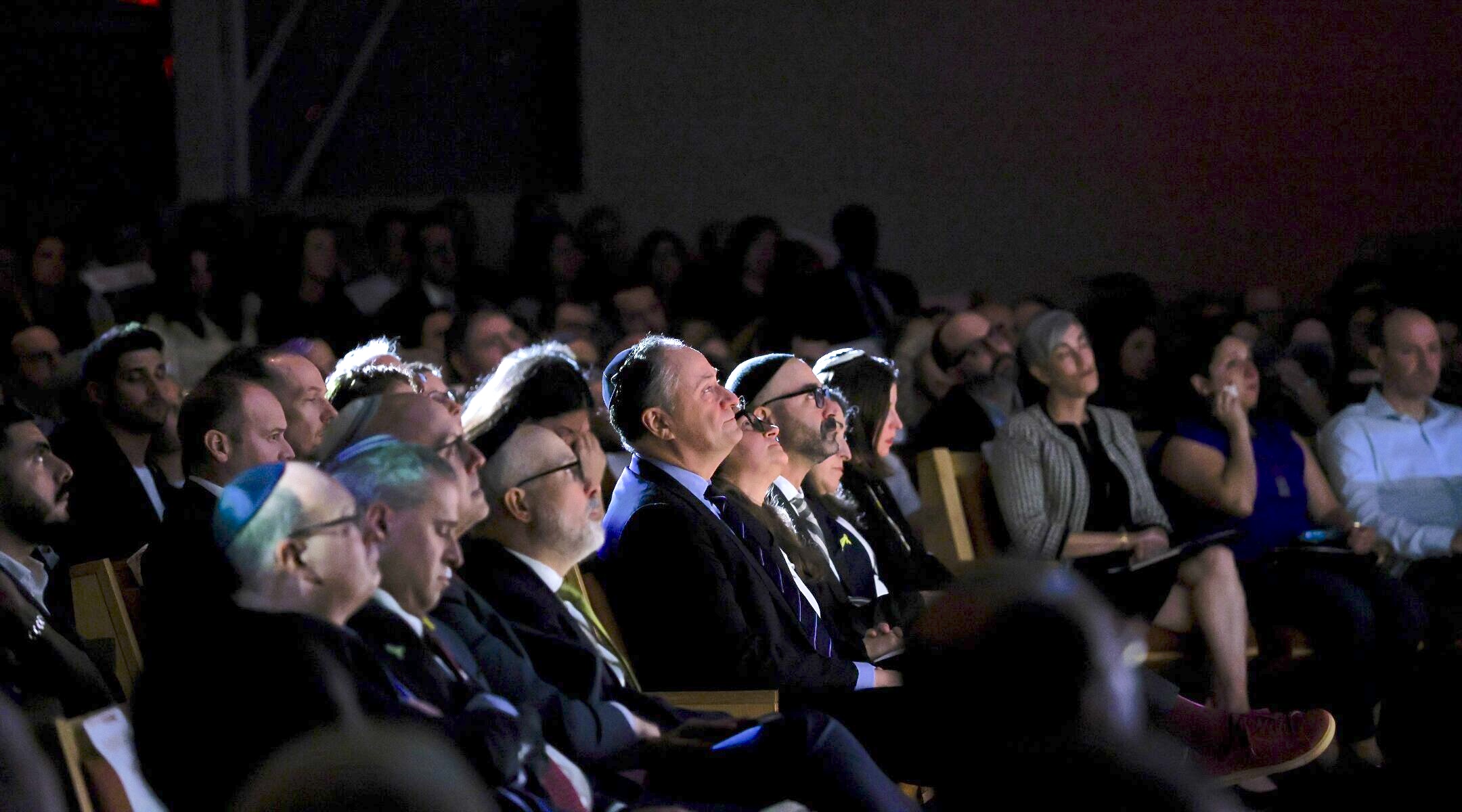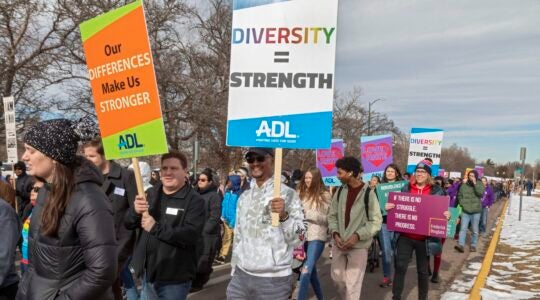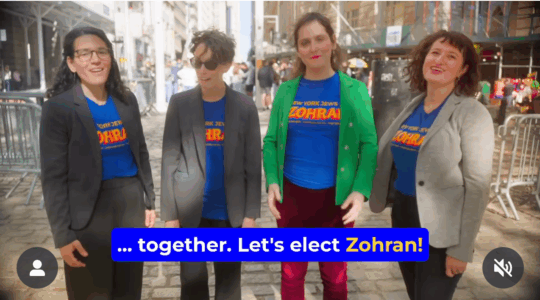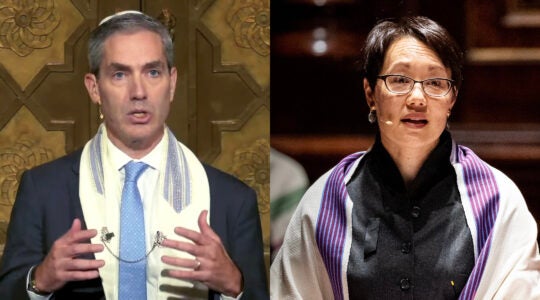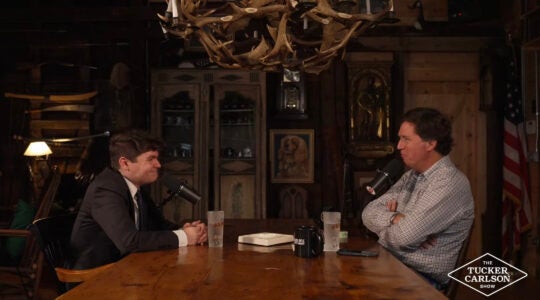WASHINGTON — In a starkly personal speech, the Jewish husband of the Democratic presidential nominee told thousands of American Jews on Tuesday night how he felt about Hamas’ murder of six hostages on the verge of freedom.
“Standing on this bimah, I can only be direct: This is hard. I feel raw. I’m gutted,” Doug Emhoff said. “I know you are, too.”
Emhoff was speaking at a vigil held at one of Washington’s preeminent synagogues, Adas Israel Congregation, where he has become a congregant since moving to the city in 2021.
Emhoff emphasized that he was relaying American Jewish grief to his wife, Vice President Kamala Harris.
“How you feel right now is how I feel,” Emhoff said. “And how we all feel is something Kamala hears directly from me.”
Just hours earlier, Merrick Garland, the U.S. attorney general, announced criminal charges against Hamas and its leadership, spurred by the terrorists’ murder of six hostages over the weekend, including an Israeli American, Hersh Goldberg-Polin. “Hamas’ leaders will pay for these crimes,” Emhoff said.
He related, as he frequently does, that he had not expected his status as the first Jewish spouse of a president or vice president to become so central to his identity. He has spearheaded the task force to combat antisemitism that President Joe Biden launched in December of 2022.
He credited Adas Israel’s rabbis, Lauren Holtzblatt and Aaron Alexander, with helping bring him closer to his faith.
“While I’m here as the second gentleman of the United States — and the first-ever Jewish White House principal — in this moment I’m here as a congregant, as a mourner, as a Jew who feels connected to all of you and grateful for the guidance of our wonderful rabbis, Aaron and Lauren,” he said. “They have become confidants and advisors. We’ve talked a lot about my own faith journey — something Kamala has encouraged in me. Among the many things they helped me find was my voice.”
Harris’ campaign is aggressively courting a Jewish community that has long voted for the party in substantial majorities, but that has been unmoored by increasing criticism of Israel within the Democrats’ progressive wing, accelerating as Israel wages the war Hamas launched last Oct. 7 with its cross-border attack.
Donald Trump, the Republican nominee, has said his affinity for Israel makes him the better candidate for Jews, and is set to make his case for the Jewish vote on Thursday at the annual Republican Jewish Coalition conference in Las Vegas, where he will appear by satellite. The RJC billed his speech as Trump speaking “not only to the RJC’s leadership gathered in Las Vegas this week but to the entire American Jewish community.”
Hours before he spoke, Emhoff appeared in an online forum launching Jewish Voters for Harris-Walz, which the campaign had said would work to “reach Jewish voters and emphasize Vice President Harris’ long track record of unwavering commitment to Israel’s security, fighting the scourge of antisemitism, and supporting Jewish values.”
The event Tuesday night overflowed the 1,700-seat sanctuary; organizers estimated there were 2,000 people in attendance. Rabbis and cantors representing all religious streams from across the Washington metropolitan area attended and crowded the bimah at the end to join in singing “Acheinu,” an ancient song pleading for the release of captives.
The evening focused entirely on freeing the 100 or so hostages remaining captive but, except for a single reference, did not mention the preeminent demand of the hostages’ families in Israel: that the government of Prime Minister Benjamin Netanyahu accept a deal brokered by the Biden administration to end the war and free the captives. Protesters brought Israel to a standstill on Monday in pressing for a deal.
Leat Corinne Unger, whose 21-year-old cousin Omer Shem Tov remains captive, said it was time to close the deal. “We need to seal this deal and bring Omer and the rest of our brothers and sisters home. We no longer have time to waste,” she said. “Let’s make sure we don’t have to apologize to another hostage or family.”
A number of those in attendance said they did not feel it was their place to insert themselves into Israeli politics, and that it was more incumbent on them to explain the plight of the hostages to the broader American public.
“We can keep the hostages in the conscience of Americans, that Americans understand the story of the hostages affects more than just Jews,” said Julie Powell, 58, a licensed clinical social worker.
Julie Soforenko, 39, said she is always attentive to non-Jews who ask her about the war.
“I think it’s important for Jewish people to keep engaging with people who are not Jewish,” Soforenko, a staffer for a Jewish nonprofit, said before the event started. “I’m so grateful that they would feel comfortable asking me and then listening to my answer.”
JTA has documented Jewish history in real-time for over a century. Keep our journalism strong by joining us in supporting independent, award-winning reporting.
